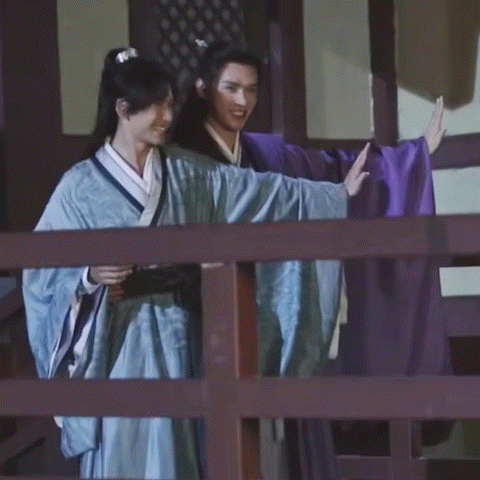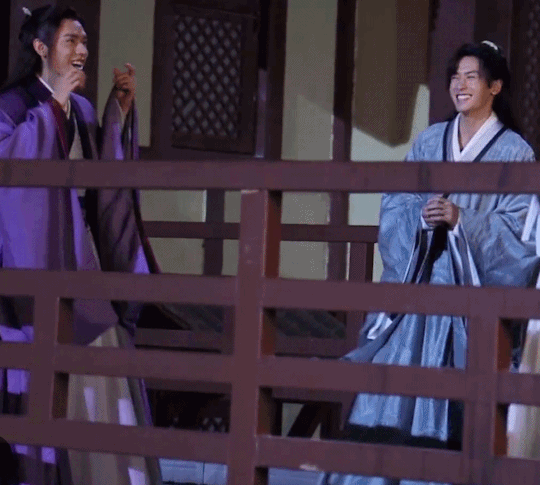#아주 둘이 좋아 죽네..증말..
Explore tagged Tumblr posts
Text
The title and the authour of this poem is unknown. It's from 古詩十九首(gǔ shī shí jiǔ shǒu; 19 old poems). The poem is regared from 漢朝(Han dynasty). Unlike the other old poems most of the poem are lyrics, singing love.
明月何皎皎 照我羅床緯
How bright the full moon! moonlight shines on my bed.
憂愁不能寐 攬衣起徘徊
Sleepless night, roem around holding sleeves.
客行雖云樂 不如早旋歸
Traveling may be pleasant, but would it be better than coming home?
出戶獨徬徨 愁思當告誰
Stray about all alone, who would I tell my worries of you?
引��還入房 淚下沾裳衣
Look faraway in vain, heading back in while tears soak my clothes.
This poem is about a wife worrying her hushand during the night under moonlight. This poem is definitely a lyric.
It changes my understanding of Zhou zishu totally. It was Wen kexing who sings love poems not Zhou zishu!! As how I love his noble moment, he must have known the meaning of that. WHY?? why would you say that??

it's because of Wen kexing's name. How Zhou zishu understood his name with dividing may not be the case here but Wen kexing said one of the old poem from 古詩十九首.
人生天地間 忽如遠行客
Living in this world is like a wanderer who hurries the road.
The common meaning of this poem is just enjoy the drink and live the moment. But some interpretations saying that the speaker of the poem is worrying something. According to the historical aspects it's the ruin of the nation. Think about Wen kexing's situation in ghost valley it's comprehensive.
This is why Zhou zishu saying the love poem❤️ Because it's also from 古詩十九首. Here is Zhou zishu noble moment, I'm sure he must have chosen, picked and selected from the poem and finally he decided to say that. Well they both are under the moonlight. Somehow, Zhou zishu knows Wen kexing leaving. At that moment he says the poem which means he would be waiting for Wen kexing. 으아아아아아아아아烈女怕纏郎!!!!열녀가넘어가버렸어!!!!!!
#山河令#word of honor#shan he ling#shl#산하령#배움이 짧아서 모르겠어#이름하나에 시가 몇개야?#미쳤나봐#주자서 도련님 모먼트#고시십구수#영어에는 量詞가 없고 한국어에서는 그 존재가 희미해져서 뭐라고 말해야할지 모르겠어#주자서도 감겼네#아주 둘이 좋아 죽네..증말..#아주 둘이 죽이 잘맞아#너무좋아 죽을거 같아#ep 25#ep25#너네 그거 사랑이야#쌍방이라고#크아아아아아아아아아아아#망한사랑인줄알았는데 아니었습니다#wenzhou
8 notes
·
View notes
Text
天涯孤鴻¹,無根行客²。
Faraway a lone goose, rootless wanderer
執子之手³,坐看雲舒⁴。
Holding your hands and watching the clouds to scatter.
Wow there are so many quotes in those sentences. Those have its own meaning with mixing, so you don't have to read all the references, you may choose which part or who's saying you are more interested.
The poems Zhou zishu saying are missing old times and loneliness. The speakers of both poem were in the harsh situation, still they tried to keep their fidelity. Maybe that's what Zhou zishu sees in Wen kexing.
The poems Wen kexing saying are mixture of feeling and relief? emptiness?? I'm not sure. The first part of the sentence is definitely flirting, then the last part has philosophical meanings. Somehow, Wen kexing is saying, he would just watch clouds and leave his vengeance behind if Zhou zishu is there with him, holding hands watching clouds together. 아으아아아아아아아아아아아아아아아아 온객행 미친놈 주자서한테 미친놈아아아아아아 ༼;´༎ຶ ༎ຶ`༽

1. 孤鴻
The title is卜算子·黄州定慧院寓居作 (bǔ suàn zǐ · huáng zhōu dìng huì yuàn yù jū zuò; write in 定慧院, huang zhou)
缺月掛疏桐,漏斷人初靜。
The wane moon hanging on the bare trees. In the dark night there is no sound nor people.
誰見幽人獨往來,縹緲孤鴻影。
Who would look a hermit walks, it looks like a shadow of flying away goose.
驚起卻回頭,有恨無人省。
Startled awake then look back, There is nobody who knowsy sorrow.
揀盡寒枝不肯棲,寂寞沙洲冷。
Hesitated to land which bare trees to sat on, where I sat the dreary sand is just cold.
This poem has written by 蘇東坡(sū dōng pō) in 明朝(Ming dynasty). At that time 蘇東坡 was banished away from his home. His poem was very metaphorical that the other were framed him with treason. So his poem is very nihilistic. Here the 孤鴻(gū yàn; a lone goose) is the poet who's situation is not a goose but the shadow of it. He did not plead guilty of his charge. Even his living was petty he didn't want to be being petty. 孤鴻 means one's fidelity.
2. 無根行客
The title of the poem is 憶少年·別歷下(yì shǎo nián · bié lì xià; who misses 歷下) by 晁補之(cháo bǔ zhī) in 宋朝(Song dynasty).
無窮官柳,無情畫舸,無根行客。
Eternal willow avenue, ruthless waterways, rootless wanderer.
南山尚相送,只高城人隔。
Saying farewells in 南山(nan shan, south mountain), the hight rampart cleaves us.
罨畫園林溪紺碧,算重來、盡成陳跡。
Small stream in the garden, green and blue, wherever I go, our trace has gone.
劉郎鬢如此,況桃花顏色。
When my hair is turning white, where the young peach flourish.
This poem is missing someone when the speaker is getting older. The opportunity to see each other getting thin.
3. 執子之手
This is from 詩經(shi jing; Classics of poem), it is in one of the chapter, 國風(guo feng). Also it has 160 peaces of poem, and this is from 邶風(Bei feng; bei nation's fork song). The title is 擊鼓(ji gu; Drumming).
The speaker of this poem is a remnant of the defeated war. He was missing home and family. The poem has 5 parts, the quote is from the 4th one, which is a lyric.
死生契闊 與子成說
Dying, living, facing, parting, promised to do so together.
執子之手 與子偕老
Clutching your hands, Promised to be old together.
4. 坐看雲舒
and the next part is from 小窗幽记(xiăo chuāng yōu jì). This sentence is very famous that used in other literature in many other countries (mainly chinese character boundary). It is also in 菜根譚(cài gēn tán) from 明朝(Ming dynasty) somehow it wasn't so popular in china but it was in Korea.
寵辱不驚, 看庭前花開花落;
No fright for be honored or be ashamed, saunter the small garden Watching flowers to bloom and to fall.
去留⽆意, 望天上雲捲雲舒
Come and go are meaningless, thoughtlessly look up the say, clouds to gather, to scatter.
It's very philosophical, it shows nihilism. Whatsoever person does cannot be affect the others. So don't need to think about what happens and worries don't matter.
#山河令#word of honor#shan he ling#shl#산하령#배움이 짧아서 모르겠어#아니 이 짧은 단어에 대체 시가 몇개야??#좀 통일 해라#주자서도 감겼네#온객행 미친놈ㅋㅋ주자서한테 미친놈#아주 둘이 죽이 잘맞아#아주 둘이 좋아 죽네..증말..#ep25#ep 25#주자서 도련님 모먼트#너네 그거 사랑이야#쌍방이라고#wenzhou
6 notes
·
View notes
Text






너희 뭐하는..?
#山河令#word of honor#shan he ling#shl#wen kexing#zhou zishu#산하령#wenzhou#ep13#ep 13#behind the scenes#아주 둘이 좋아 죽네..증말..#너무좋아 죽을거 같아
35 notes
·
View notes